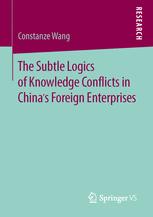

Most ebook files are in PDF format, so you can easily read them using various software such as Foxit Reader or directly on the Google Chrome browser.
Some ebook files are released by publishers in other formats such as .awz, .mobi, .epub, .fb2, etc. You may need to install specific software to read these formats on mobile/PC, such as Calibre.
Please read the tutorial at this link: https://ebookbell.com/faq
We offer FREE conversion to the popular formats you request; however, this may take some time. Therefore, right after payment, please email us, and we will try to provide the service as quickly as possible.
For some exceptional file formats or broken links (if any), please refrain from opening any disputes. Instead, email us first, and we will try to assist within a maximum of 6 hours.
EbookBell Team

4.0
56 reviewsThis book investigates knowledge interactions in China’s foreign enterprises. It reveals that cultural differences strongly account for knowledge-related obstacles, namely knowledge leakage and insufficient knowledge sharing. Contrary to conventional wisdom, however, widespread cultural arguments such as Confucianism or collectivism hardly apply to Chinese employees’ handling of knowledge. In fact, more subtle cultural logics are relevant in daily work, which are connected to the perceived stability of the enterprise itself. But these usually go unnoticed. Thus, rather than being distracted by a national “Chinese culture”, managers can take real action to solve knowledge conflicts in their particular enterprise.